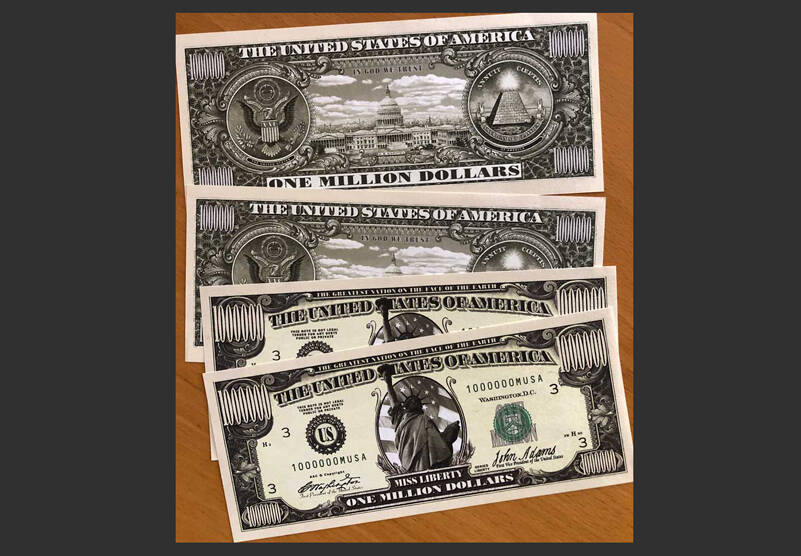By Morf Morford
Tacoma Daily Index
To put it mildly, money is complicated.
Money is, by definition, a medium of exchange; money has no inherent practical use or value.
Money represents value. Whatever that means.
If you can’t eat or wear money, what is it?
Money, far more than any practical, tangible object, from an apple to a pair of shoes, is an indicator of our faith and confidence in it.
And, oddly enough, other people’s confidence in it.
What other people have – or want to have – has a lot to do with how much we value that same object.
We may not have a “floating currency” in the usual sense, but our attitudes towards money – and what it can do – or get – for us seems to change continually.
From good health to sound sleep to long-lasting friendships, in spite of the near mystical attributes we assign to money, there are many things beyond its reach.
How much is enough?
How much money would it take to make you feel wealthy? What is wealth? What is enough money?
These were just a few of the questions raised and explored through a Charles Schwab Corp. survey taken a few months ago.
Money, it turns out, is not very well defined – for any of us.
Money, or more precisely, wealth (or its opposite, economic need) is relative – and has far more to do with expectations and those around us, than any stable, reliable or predictable value.
According to this survey, most of us believe that it takes $2.2 million in net worth to be “wealthy,” down from $2.6 million in 2020. And in King County and much of Pierce County, the average home value is about one-third of that total.
Yes, that not a mistake; our collective sense is that to be wealthy is to have lower total assets than two years ago.
Respondents to the survey also thought it takes $774,000 to be “comfortable,” which is down from $934,000.
As we all know, consumer price inflation has soared from about 2% each year before the pandemic to roughly 8% now; you might think people would need more cash to feel “wealthy” or “comfortable”.
But it turns out that for many of us, “value” has taken on a very different meaning.
Wealth is about more than money
More than half of those surveyed said they’d take a lower-paying job for a company that “better represents personal values or interests”.
Perhaps money is not as important, or at least as central as it once was, when it comes to a sense of well being or security.
89% of respondents said they wanted fulfilling work, 85% said they wanted the respect of their colleagues and 84% said values guided their career.
42% of Americans are convinced that money allows, or at least facilitates freedom. Another 23% wanted the flexibility finances allow. 18% saw money as opening opportunity. Only 10% saw money as a barometer of achievement.
At one level, money is all about the numbers.
But for some, the “bottom line” is only the beginning.
If money, at its most basic, is how we “pay” for things – money is at root, all about recognition and attention.
The retirement horizon
Whatever our age or career position, we are all irreversibly headed for that one destination; retirement.
But how ready are most of us for it?
One generally agreed-upon rule of thumb for what a person might need to retire comfortably is 10 times their pre-retirement-age annual income.
In other words, if you make $45,000 each year, you should have somewhere in the neighborhood of $450,000 in reserve for your retirement.
More than half of us, according to a another recent survey respondents in or nearing retirement say they have less than $250,000 saved.
In most situations, $250,000 is a lot of money, but stretched over ten – or twenty – years, it’s not very much. Over ten years, that adds up to just under $70 a day. Over twenty years, its about $35 dollars a day.
An 8% rate of inflation, especially over time, can make a dramatic cut in our ability to pay our daily bills. Or keep our homes.
It’s not exact, but 8% times 12 years is right up against 100%.
But many of us have nowhere near that much in savings. According to a series of recent surveys, 22% of Americans have only $1,000 to $5,000 in savings. 51% of Americans have $5,000 or less in savings, while 35% have $1,000 or less. The average American’s monthly expenses are about $5,100 – and that’s not enough to cover an emergency.
And, as I can say from experience, emergencies are most likely to come when we least expect them – and generally cost far more than we might anticipate.
Replacing that dying appliance or repairing a car can demolish the best financial intentions – and budget. A savings account set aside for emergencies is your best buffer against these unforeseen events.
51% of Americans had less than three months’ worth of living expenses in their emergency funds, according to a Bankrate survey. That includes 25% who said they had no emergency savings at all.
No matter how old you are, start, or keep, saving.
There’s an old saying that budgeting is planning where your money goes instead of wondering where it went.
Just keeping track of your spending – and attempting to plan for future spending and saving can make a world of difference in your financial – and mental – well being.





